8 de noviembre 2022
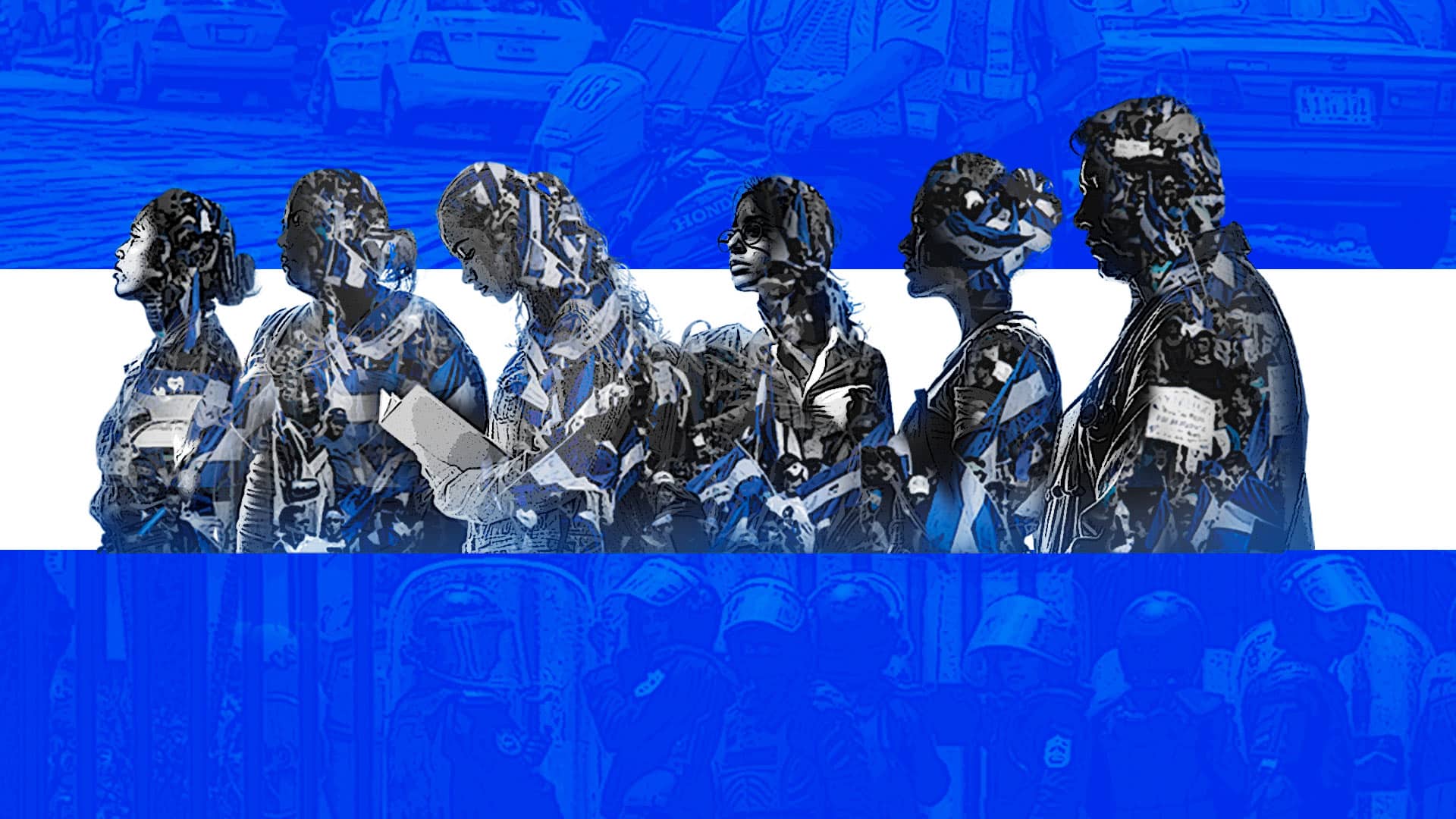
Six Years With April in Tow: Life Under Nicaragua's New 'Normal'

PUBLICIDAD 1M
PUBLICIDAD 4D
PUBLICIDAD 5D
Improvised FSLN “computing centers” identified their supporters who had not yet voted, to go for them; most others stayed home.
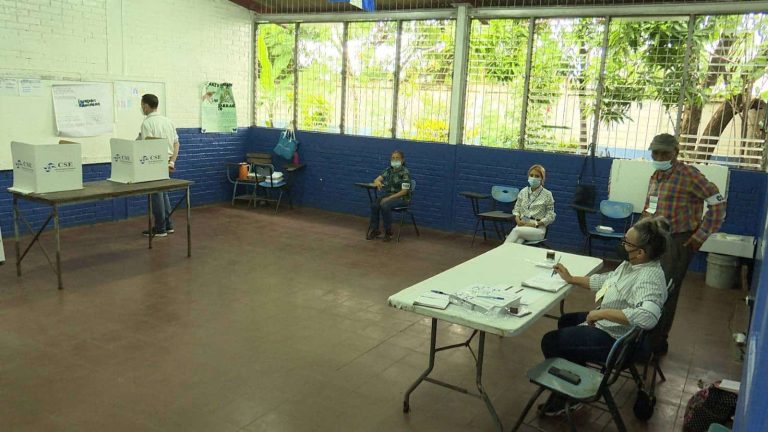
An empty polling station in Managua on November 6th. Photo: Voices in Freedom | Confidencial
From the early hours on Sunday, Sandinista supporters were instructed to pack the polling stations for photo ops. However, the images of the same government propaganda were clear: rows of no more than ten voters. According to citizen reports from Voces en Libertad, from 13 departments, the queues at the Voting Centers were mostly made up of Sandinista activists, political operators and state workers.
Citizen reports from Managua, Matagalpa, and Madriz show that state workers and Sandinista activists received various indications. These included going to vote first thing in the morning, taking a selfie and sharing it on their social networks. Also, “monitor, publish, comment and share the environment of peace and security of the electoral process.”
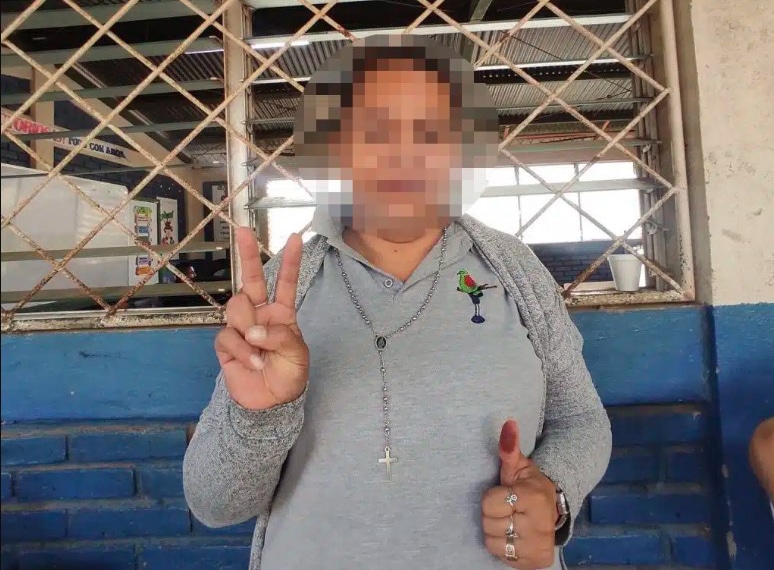
Sandinista activists and public employees had to send a selfie of their stained thumbs. Photo: Taken from networks / Confidencial
In addition, one block from each Voting Center, the political secretaries and the Sandinista Electoral Victory Units improvised “computing centers”, where they kept a count of supporters who had not yet voted, in order to go get them with list in hand.
In Madriz, state workers were sent warnings via WhatsApp that if they did not vote they would be fired. “At the same time they tell them to take a selfie to show that their finger is already stained with the ink that confirms that they have already cast their vote,” citizen reports indicated.
In this department little influx of voters was observed. However, the mobilization of citizens through State vehicles and those of City Hall was notorious. They were collecting Party members who had been on lists for three months.
“They came to my house on a three-wheel motorcycle so that I would come with my wife and my mother-in-law to vote for the candidates of my party (FSLN), because they thought that we were not going to come. So that’s over now and we are going to our little house here in the Chureca neighborhood of Somoto. It is unfortunate that the polling station is empty, before we used to stand in line and now this place seems deserted,” said a 62-year-old citizen who went to vote at the Madriz High School.
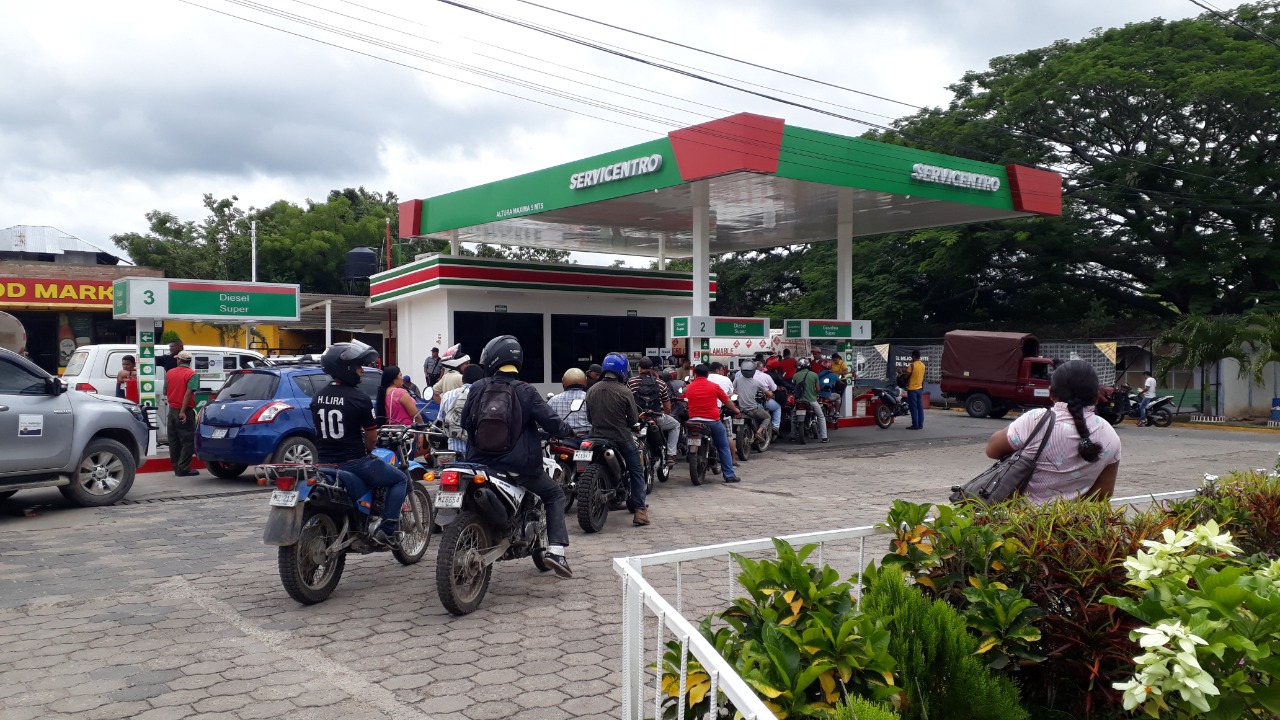
Sandinista activists in Madriz filling up their tanks to transport voters. Photo: Voices in Freedom | Confidencial
Sources in Madriz revealed that, since Saturday afternoon, groups of Sandinista motorcyclists were observed filling their tanks for Sunday’s “mission to guarantee that all duly registered party supporters go out to vote early”.
The mobilizations were also observed in Carazo. Citizen reports from that department confirmed that motorcycles were circulating around the city. Meanwhile, vans and microbuses remained at the Sandinista campaign headquarters, which would be used to transport sympathizers in the municipalities.
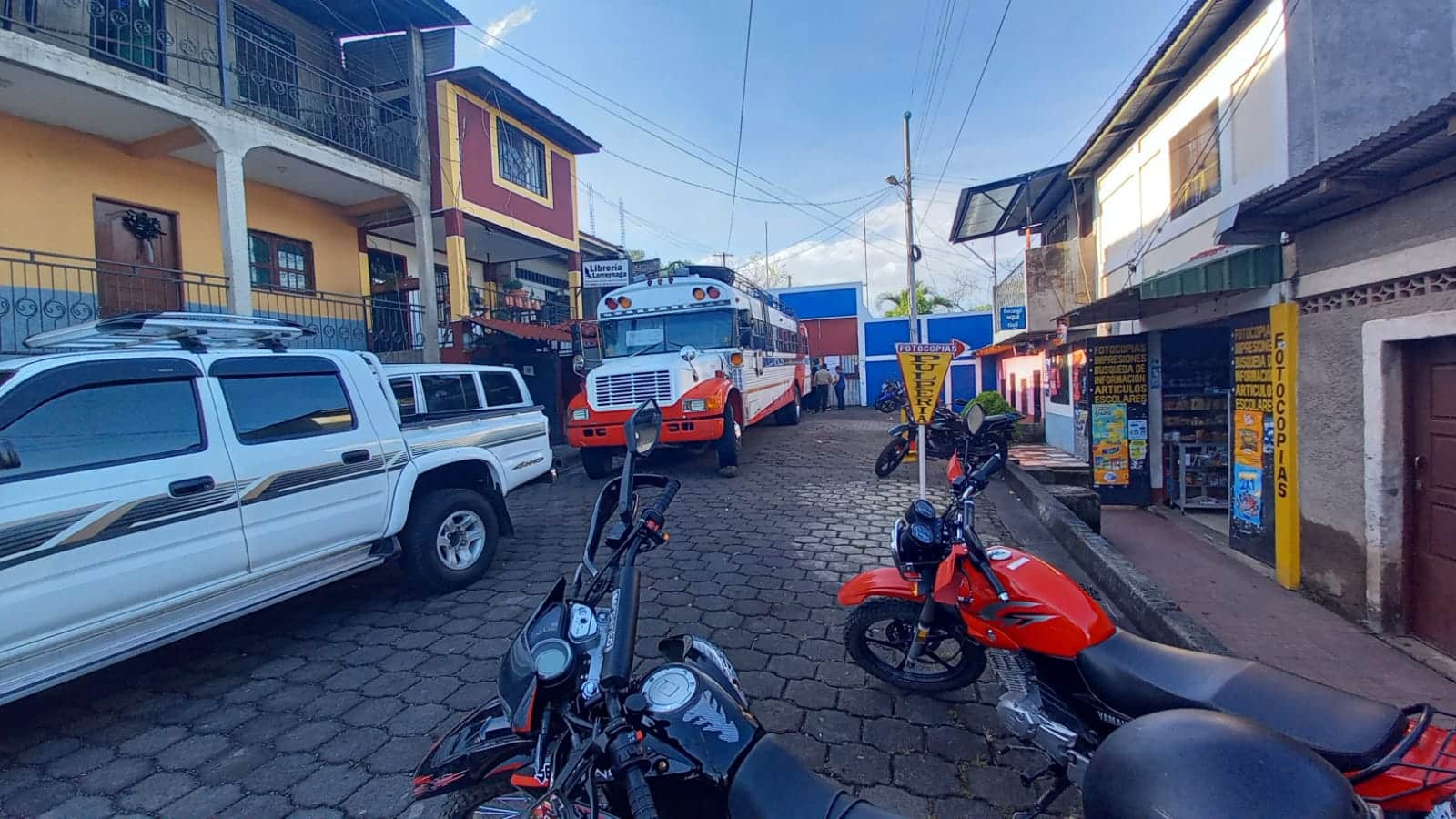
Trucks and buses were used to transport Sandinista sympathizers from the municipalities to the city of Matagalpa. Photo: Voices in Freedom | Confidencial
“There are almost no moto-taxi services because most are being used by Sandinistas to transport their supporters,” the citizens point out.
Despite this mobilization, few citizens were seen at the polls. The population continued with their routine Sunday activities such as going to mass or opening businesses in the municipal market.
In Matagalpa, it was learned that some Sandinista activists arrived early in the morning at the municipal and departmental FSLN offices on motorcycles or vans, and then headed to the neighborhoods to “encourage” the population to vote. They used the phrase: “comrades, we are waiting for you.” However, the number of voters was scarce.
In Rivas, the presence of paramilitaries circulating on motorcycles was also observed outside the polling stations of the municipalities of Potosí and Buenos Aires. “One of the voting centers, in the municipality of Buenos Aires, was also completely empty, only the presence of the police and the poll workers,” the sources reported.
In Masaya, little influx of voters was also observed. On Sunday morning, at one of the polling stations visited there were barely ten Sandinista supporters lining up to vote. Meanwhile, in another, public employees were observed in the lines, under the close watch of government officials.
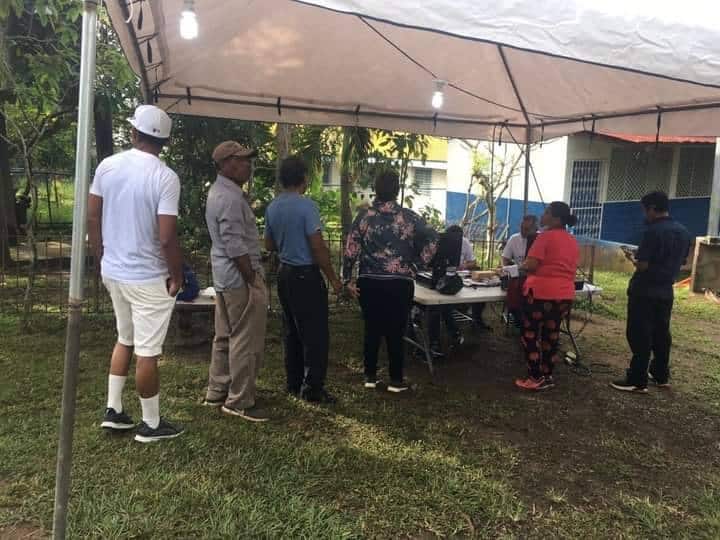
Citizen reports indicate that the Voting Centers opened late, so for a few minutes their appeared numerous voters. Photo: Voices in Freedom | Confidencial
In Granada, few voters were observed. Citizen reports indicate that the polling stations opened late. In Chinandega there was also little presence of citizens. Local sources explained that in the municipality of El Viejo, opponents were besieged by Sandinista neighbors and by National Police patrols.
“In Tonala, Puerto Morazán, two patrols roamed the streets, although with few residents in the voting center, mainly Sandinistas supporters. In the rural area of this municipality there is more control, and this is how voters were observed in the Lucrecia Lindo Community School,” they said.
In Leon, the streets were empty and the citizens who were out and about were busy with their daily activities. Likewise, the sources indicate that they noticed Police vigilance. “They were dressed in black jackets and took photos of independent journalists.”
The same scene was repeated in Jinotega. In the early hours of the morning there was a calm atmosphere. The streets were silent and there were few people outside. By ten in the morning, at a polling station in Pantasma, only 34 people had voted, revealed a prosecutor from the Nicaraguan Liberal Alliance.
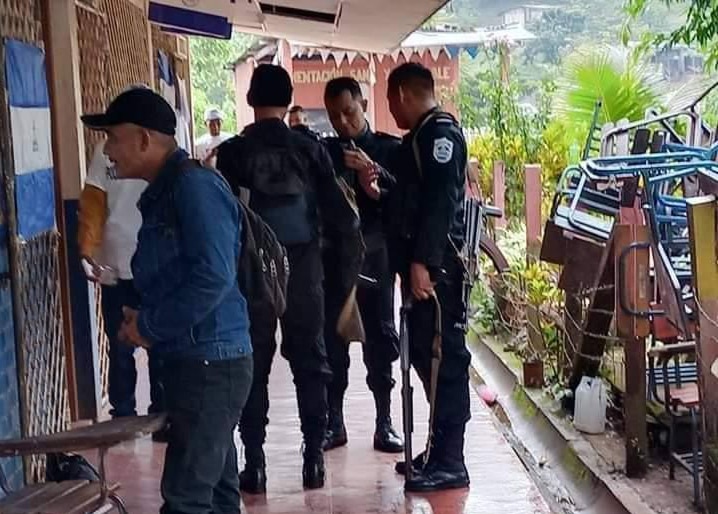
Police were stationed outside the polling stations in Jinotega. Photo: Voices in Freedom | Confidencial
In the voting center at a school, in Santa Teresa, San Jose de Bocay, Jinotega, there were only Electoral officials and Police officers, confirmed a community leader in the area.
Boaco’s voting centers also looked bleak. At one school visited only four people were observed lining up to vote. Likewise, the presence of a police officer was noted outside the center.
In Estelí, little influx of voters was observed. However, it was observed that the Sandinista activists arrived first thing in the morning.
Rows of voters were observed at the polling stations in El Castillo, Río San Juan. However, these did not exceed 30 citizens. “In this municipality there are few places to vote. In some traditional voting centers there were even fewer tables. The presence of police officers near the voting center was also visible, and the party activists who mobilized the most in the first hours were mainly from the government party,” stated citizen reports.
In Bluefields, South Caribbean, little citizen participation was observed. Before the polling stations opened there were lines, but they were not very long. And in the absence of voters, Sandinista sympathizers began to transport people from more remote areas, local opponents said.
“Since last night they have been sending us messages to the work groups, telling us to go vote,” denounced a worker from a state institution who lives in Bluefields.
Another worker assured “they are pressuring us (…) they tell us that it is obligatory.” They also point out that throughout the day they have received messages on their phones reminding them that “thanks to our commander (Daniel Ortega) they have work.” Then comes the threat: “remember that we have the list of those who have gone to vote”, they warn them.
*With information from Voices in Freedom
This article was originally published in Spanish in Confidencial and translated by Havana Times.
PUBLICIDAD 3M
Confidencial es un diario digital nicaragüense, de formato multimedia, fundado por Carlos F. Chamorro en junio de 1996. Inició como un semanario impreso y hoy es un medio de referencia regional con información, análisis, entrevistas, perfiles, reportajes e investigaciones sobre Nicaragua, informando desde el exilio por la persecución política de la dictadura de Daniel Ortega y Rosario Murillo.
PUBLICIDAD 3D